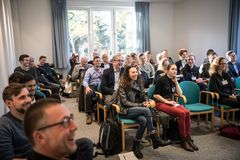Conference Conclusion: The Study of Economics Should Contribute More to Sustainable Development
The field of economics is once more under fire: too little research is being devoted to the development of sustainable, feasible solutions to the problems of climate change, financial crises, and social and economic structural change; in the wake of the recent financial crisis, a fundamental reform of the teaching of economics is still pending. In order to improve this situation, the conference “Economic Sciences and Social-Ecological Transformation” was attended on 6 November 2017 by approximately 200 participants from various research fields and areas of interest that included economics, the social and sustainability sciences, and representatives of civil society, business, and public policy. They debated how scientists in the fields of economics and business could better contribute to a sustainable transformation of society.
The discussions focused on topics such as the future of mobility, socially and environmentally equitable approaches to the digital transformation, and alternative economic models such as the public interest economy. IÖW, together with Cusanus Hochschule, the Netzwerk Plurale Ökonomik, the Wuppertal Institute für Umwelt, Klima und Energie, and nine other partners called together the conference, which was held in Berlin. The organizers and partners are representative of the various institutions and locations where transformative research is envisioned and practiced: progressive colleges, specific chairs at traditional universities, university student groups, non-university research institutes, think tanks and civil society organizations.
Compliance with climate and sustainable development goals must become a normative framework
The conference showed that a great variety of theoretical and methodical approaches exist within the various currents of economic research. These have the potential to contribute to a better understanding of socio-ecological problems and the development of practical solutions. In the debates, however, the risks of a greater normative orientation were also noted. Historical considerations demonstrated that the economic sciences have always had a transformative impact on social thinking and action; thus the discourse on transformative research is not entirely new. What is new, however, is the call by economists for a stronger nexus to the internationally binding climate protection and sustainable development goals (SDG) and the incorporation of these goals as a normative frame of reference in their own research.
The fundamentals of economics are lacking in sufficient critical consideration
Many speakers called for economists to take a more critical look at the theoretical foundations of their own discipline. Nils aus dem Moore, research group leader at the RWI – Leipniz-Institut für Wirtschaftsforschung, made the case for a more socially relevant approach to economics research, one open to contributions from other scientific disciplines and current social practices. “Our system of science and research has not done enough to date to support such interdisciplinary and transdisciplinary research projects in economics and places too much emphasis on the attainment of excellence within the discipline. Here we anticipate significant changes in the future,” responded Thomas Korbun, IÖW scientific director. Sigrid Stagl from the Vienna University of Economics and Business Administration emphasized the further call for an international debate on transformative economics in the future.
“A strengthening of transformative research approaches lays the foundation for more socially relevant policy-making, which in turn will open up greater options for political action. This may well be of interest to the next federal government,” noted Uwe Schneidewind, president of the Wuppertal Institute for Environment, Climate and Energy, at the conclusion of the conference.



